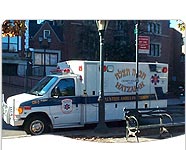 |
 
Parental dilemma: What to do when your child is sick
Mayo Clinic: Children are bound to come down with the occasional cold or other viral illness, especially when cold weather keeps the whole class cooped up inside all day, coughing and sneezing on each other. Young children's immune systems haven't learned to recognize and resist most common viruses. That's why, until they're 8 or so, kids seem to bring home every cold, flu or intestinal virus that's making the rounds at school. Infants and preschoolers have an average of one to two colds a season, or eight a year.
Whether or not to keep your sick child home from school or child care can be a difficult decision to make, especially if your employer has no provision for time off to care for an ill dependent or if you have an inflexible work schedule. Your best bet is to have backup plans in place before such situations arise.
When your child should stay home
First off, you need some simple guidelines to determine when your child's illness really warrants staying out of school. In general, children should stay home when they don't feel well enough to participate in normal daily activities and lack sufficient alertness to learn or play.
The following signs, symptoms or conditions also are cause for missing school:
•
Vomiting twice or more over a 24-hour period or being unable to tolerate normal food and drink, or both.
•
Having a temperature of 102 F rectally, 101 F orally or 100 F axillary (in the armpit) or higher.
•
Severe coughing or difficulty breathing
•
Repeated bouts of severe diarrhea or bloody stools for at least a day
•
Persistent abdominal pain (more than 2 hours)
•
Open sores on the mouth
•
A skin rash or red eye from an undetermined cause
•
Head lice or scabies
•
Other contagious conditions such as strep throat, impetigo, chickenpox, pertussis, mumps, hepatitis A, measles, rubella, shingles or herpes simplex
If your child's illness seems to be more than just a common cold or flu, you may want to contact his or her nurse or doctor to see whether the symptoms could indicate something more serious. The doctor or nurse who regularly sees your child can help you determine how bad the illness is and recommend measures to relieve symptoms and speed recovery.
Also, be sure to review the guidelines from your school or child-care provider about when to keep children home. Often, these policies focus on the presence or absence of fever, a symptom that requires different responses at different ages.
If your child meets none of the above criteria but asks to stay home frequently, consider the possibility of underlying causes such as classroom problems or worries about friends. In some cases, this may call for counseling, a meeting with your child's teacher or a conversation with your child's doctor.
Some workplaces offer sick-child care services for employees who must go to work even when their child is too ill for regular child care. Although parents may worry that their child will pick up another illness at a sick-child care center, the fear is largely unfounded. In fact, many sick-child care centers follow increased infection-control procedures, such as using disposable dishes and cutlery and requiring frequent hand washing and toy cleaning.
Home alone: Is your child ready?
Some children can stay home alone when they're mildly ill. Before leaving a child unattended, though, assess the following factors:
•
Your child's overall maturity. Children age 7 and under should never be left home alone. By age 8 or 9, you can leave your child alone for only short periods of time — two hours or less. Once your child is 10, time at home alone should not exceed eight hours at a stretch, and by age 11 and up, 10 hours is the longest your child should be unsupervised.
•
Your accessibility during the day. Your child will be safer staying home alone if he or she can reach you quickly by phone or in person. If you need to be away, let your child know how to reach you and call home every few hours to see how things are going.
•
Your child's symptoms. Evaluate your child's condition before leaving the house for the day. If your child isn't getting better or actually seems worse, call your doctor to see what you should do.
•
Your child's safety skills. A child who is left unattended should understand common household hazards and know how to use appliances safely. Also emphasize the importance of not answering the door for a stranger and never telling someone on the phone that they're home alone. Before you decide to leave your child home alone for the first time, have a discussion about what to do and who to call in case of a fire emergency. Be sure to practice the escape plan and fire drill with your child.
•
Your child's reaction to being left alone or with a babysitter. Be sensitive to your child's response to staying alone. When they're sick, even older children may feel anxious and lonely in an empty house or apartment. Similarly, a sitter may not be able to console a younger child who is ill. Regular phone contact with you can help, as can a thorough debriefing about how your days went for the both of you when you get home.
•
Your child's ability to manage medication. Measure appropriate doses ahead of time and store them in envelopes or containers. Keep simple written instructions close by, or ask the child to call you before taking any medication.
Staying home alone is a big responsibility for a young child to assume. Be prepared and make arrangements now for an alternate caregiver when you can't stay at home with your child. A relative or a friend may be able to help. But don't put off planning until the morning you need help.
Offering care and reassurance to a sick child
If you decide to stay home with your sick child, make sure he or she rests and relaxes. Provide a little extra tender loving care in the form of a clean set of bedsheets, a cool sponge on the forehead, a hand to hold, or even the novelty of an afternoon nap in your bed.
Flexibility also may help nurse your child back to health. For example, to keep your child hydrated, you may let him or her have a frozen juice bar or a decaffeinated soda pop even if you normally restrict them. Remember that sick children may temporarily return to behaviors that they've outgrown, such as using their blanket, thumb sucking or nose picking. They may also be extra moody and irritable during this time.
Children are naturally curious about what's going on inside their bodies, especially when they're not feeling well. Be prepared to answer questions such as "How sick am I?" and "When am I going to get well?" Offer simple, honest and direct answers. Children can easily pick up on doubt or hesitation. If you don't know the answer to a question, say so and offer to find out. The bottom line to communicate is: "You're safe, and we'll take care of you."
Finding ways to beat boredom
Your child's most troubling symptom might be boredom. As a caregiver, one of your prime functions is healthy distraction. Plan ahead for activities to pass the time:
Use television constructively and creatively. Check the schedule for children's programming. If you have a VCR, tape appropriate programs for your child to watch during an illness. Build a library of such prerecorded videotapes.
Take the opportunity to read to your child for longer periods than usual. This activity serves both an educational and a therapeutic purpose.
Plan low-key activities: puzzles, coloring, building projects, board games or trivia questions.
Ask friends and relatives to call your child.
The time you spend with your child when he or she is under the weather may serve to deepen your relationship. Whenever possible, give sick children extra time and affection. Staying with them can allow you to take a day off, slow down and savor what's truly important.
(c) 2006 Mayo Foundation for Medical Education and Research. All rights reserved. Terms of use. URL: http://health.msn.com/guides/coldandflu/articlepage.aspx?cp-documentid=100050355
Back to Safety Tips Index
|









